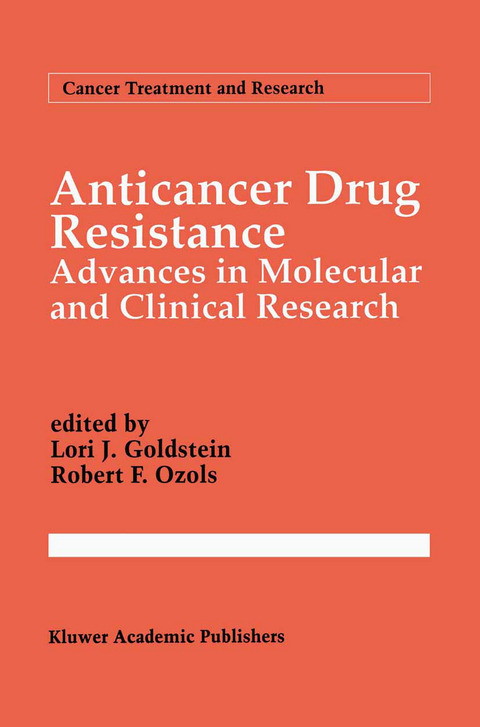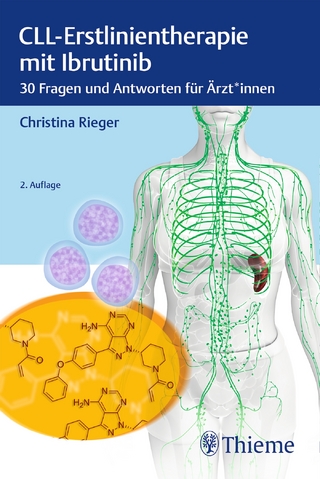
Anticancer Drug Resistance
Advances in Molecular and Clinical Research
Seiten
1994
Springer (Verlag)
978-0-7923-2836-0 (ISBN)
Springer (Verlag)
978-0-7923-2836-0 (ISBN)
Over the last 50 years, drug development and clinical trials have resulted in successful complete responses in diseases such as childhood leukemia, testicular cancer and Hodgkin's disease. We are still, however, confronted with over 500,000 cancer-related deaths per year. Clearly, the phenomenon of drug resistance is largely responsible for these failures and continues to be an area of active investigation.
Since the last volume in this series, we have learned that the energy-dependent drug efflux protein, p-glycoprotein, encoded by the MDR 1 gene, is a member of a family of structurally related transport polypeptides, thus allowing us to explore the relationship between structure and function. In addition to ongoing well designed clinical trials aimed at reversing MDR mediated drug resistance, the first gene therapy studies with the MDR 1 gene retrovirally transduced into human bone marrow cells are about to be initiated.
Although MDR is currently the most understood mechanism of drug resistance, we are uncovering increasing knowledge of alternative molecular and biochemical mechanisms of drug resistance to antimetabolites, cisplatin and alkylating agents and developing new strategies for circumventing such resistance.
It is clear that drug resistance is complex, and many mechanisms exist by which cancer cells may overcome the cytotoxicity of our known chemotherapeutic agents. As our understanding of each of these mechanisms expands, well designed models will be necessary to test laboratory hypotheses and determine their relationship to drug resistance in humans. It is this integration of basic science and clinical investigation that will both advance our scientific knowledge and result in the improvement of cancer therapy.
Since the last volume in this series, we have learned that the energy-dependent drug efflux protein, p-glycoprotein, encoded by the MDR 1 gene, is a member of a family of structurally related transport polypeptides, thus allowing us to explore the relationship between structure and function. In addition to ongoing well designed clinical trials aimed at reversing MDR mediated drug resistance, the first gene therapy studies with the MDR 1 gene retrovirally transduced into human bone marrow cells are about to be initiated.
Although MDR is currently the most understood mechanism of drug resistance, we are uncovering increasing knowledge of alternative molecular and biochemical mechanisms of drug resistance to antimetabolites, cisplatin and alkylating agents and developing new strategies for circumventing such resistance.
It is clear that drug resistance is complex, and many mechanisms exist by which cancer cells may overcome the cytotoxicity of our known chemotherapeutic agents. As our understanding of each of these mechanisms expands, well designed models will be necessary to test laboratory hypotheses and determine their relationship to drug resistance in humans. It is this integration of basic science and clinical investigation that will both advance our scientific knowledge and result in the improvement of cancer therapy.
1. Genetics of Drug Resistance.- 2. P-Glycoprotein Homologues.- 3. Role of Protein Kinase C in Multidrug Resistance.- 4. Transcriptional Regulation of Multidrug Resistance Gene Expression.- 5. In vitro Models of Multidrug Resistance.- 6. In vivo Models of P-Glycoprotein-Mediated Multidrug Resistance.- 7. Molecular Diagnosis of Multidrug Resistance.- 8. Clinical Reversal of Multidrug Resistance.- 9. Role of Gene Amplification in Drug Resistance.- 10. Biochemical Modulation as an Approach to Reversal of Antimetabolite Resistance.- 11. Mechanisms of Acquired Resistance to Cisplatin.- 12. Mechanisms of Resistance to Alkylating Agents.- 13. Mechanisms of Resistance to Topoisomerase Inhibitors.
| Reihe/Serie | Cancer Treatment and Research ; 73 |
|---|---|
| Zusatzinfo | XIII, 294 p. |
| Verlagsort | Dordrecht |
| Sprache | englisch |
| Maße | 155 x 235 mm |
| Themenwelt | Medizin / Pharmazie ► Medizinische Fachgebiete ► Onkologie |
| Medizin / Pharmazie ► Medizinische Fachgebiete ► Pharmakologie / Pharmakotherapie | |
| ISBN-10 | 0-7923-2836-1 / 0792328361 |
| ISBN-13 | 978-0-7923-2836-0 / 9780792328360 |
| Zustand | Neuware |
| Informationen gemäß Produktsicherheitsverordnung (GPSR) | |
| Haben Sie eine Frage zum Produkt? |
Mehr entdecken
aus dem Bereich
aus dem Bereich
Korrigierter Nachdruck 2020 mit allen Ergänzungen der UICC aus den …
Buch | Softcover (2020)
Wiley-VCH (Verlag)
CHF 59,95
30 Fragen und Antworten für Ärzt*innen
Buch | Softcover (2023)
Thieme (Verlag)
CHF 6,95


